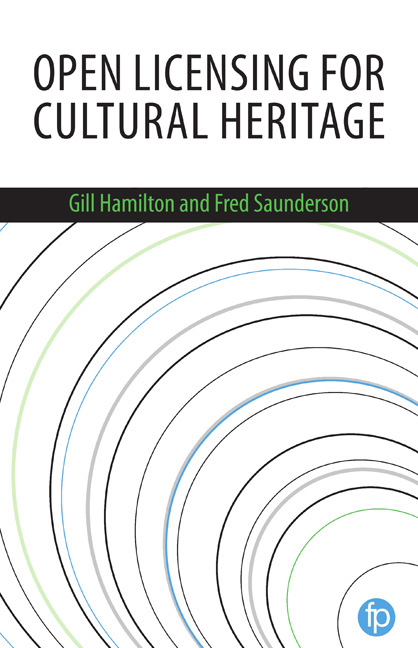Book contents
- Frontmatter
- Contents
- List of figures and tables
- Acknowledgements
- About the authors
- 1 Introduction
- 2 The open movement: its history and development
- 3 Copyright and licensing: a background
- 4 Open licensing: the logical option for cultural heritage
- Introduction to case studies
- 5 Small steps, big impact – how SMK became SMK Open
- 6 The British Library experience of open metadata licensing
- 7 Open policy and collaboration with Wikimedia at the National Library of Wales
- 8 Newcastle Libraries – the public library as a place to share culture
- 9 Developing open licensing at the National Library of Scotland
- 10 The Wellcome Library
- 11 Developing an open educational resources policy and open approaches to mitigate risk at University of Edinburgh
- 12 How to implement open licensing
- 13 Using and reusing openly licensed resources
- 14 Conclusion
- Index
1 - Introduction
Published online by Cambridge University Press: 08 June 2018
- Frontmatter
- Contents
- List of figures and tables
- Acknowledgements
- About the authors
- 1 Introduction
- 2 The open movement: its history and development
- 3 Copyright and licensing: a background
- 4 Open licensing: the logical option for cultural heritage
- Introduction to case studies
- 5 Small steps, big impact – how SMK became SMK Open
- 6 The British Library experience of open metadata licensing
- 7 Open policy and collaboration with Wikimedia at the National Library of Wales
- 8 Newcastle Libraries – the public library as a place to share culture
- 9 Developing open licensing at the National Library of Scotland
- 10 The Wellcome Library
- 11 Developing an open educational resources policy and open approaches to mitigate risk at University of Edinburgh
- 12 How to implement open licensing
- 13 Using and reusing openly licensed resources
- 14 Conclusion
- Index
Summary
Imagine a world in which every single person on the planet is given free access to the sum of all human knowledge. (Jimmy Wales)
This bold and challenging vision set out by Wikipedia's founder Jimmy Wales is familiar to anyone working in libraries and cultural heritage. After all, we have been providing exactly this sort of service for centuries by giving (in most cases) free at the point of use access to our collections to people who visit our libraries, archives, galleries and museums, whether at local, institutional or national level. Many of the people who have over time benefited from this access have taken what they have read, seen, experienced or learned and gone on to create new knowledge, new art, new inventions and new discoveries. In this information revolution that is the digital era, we can in new and significant ways extend our reach beyond the physical constraints of our buildings and our analogue books, manuscripts, maps, paintings and artefacts. We can today share our collections with the wider, global world, thanks to innovations like digital photography, the internet and the world wide web. To ensure that everyone who visits us digitally has the same opportunities to use, learn from and be inspired by our resources as those who visit us physically, we must endeavour to provide free and open access to our digital collections. The tool for achieving this is open licensing. When we apply open licences to our resources we ensure that cultural heritage organisations continue to play a central role in supporting access to information and knowledge at a global level. In doing so, organisations play their part in turning Wales’ imagined world of free universal access to all human knowledge into reality.
This book will provide you with the insight, knowledge and confidence necessary to implement an open licensing approach within a gallery, library, archive or museum. The rewards of being open can be significant, and the costs and risks can be much lower than anticipated. Some of the biggest successes of modern communication and business, such as the internet and the world wide web, are derived from and based on being open. Openness, at its core, can expose the ‘prior art’ that sits within our collections.
- Type
- Chapter
- Information
- Open Licensing for Cultural Heritage , pp. 1 - 6Publisher: FacetPrint publication year: 2017

